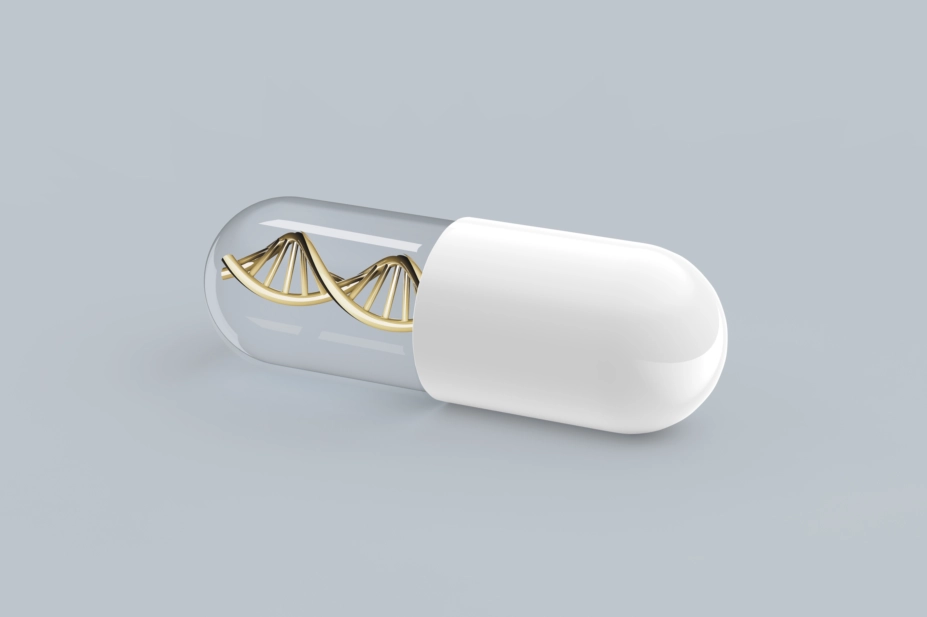
JL / Shutterstock.com
Following the publication of the full sequence of the human genome in 2003, much was made of its potential to transform clinical practice. And now, with falling sequencing costs and our improving knowledge of pharmacogenetics — the effects of genetic variation on a patient’s response to a drug — genetic testing is being used to guide drug therapy. Pharmacists already identify drug interactions, interpret therapeutic drug monitoring, calculate kidney function and implement dose adjustments. We can now predict a patient’s likelihood to benefit from certain medicines, or their risk of being harmed. This is an important advancement in therapeutics and one that pharmacists must fully embrace[1]
.
Individual responses
Variations in genetic code (genetic polymorphisms) can lead to differences in how genes are expressed and, consequently, how a person may respond differently to one medicine compared to another.
Pharmacogenetic polymorphisms are either somatic (acquired genetic variation), which is useful to identify in cancer medicine, or germ-line (inherited), most commonly affecting what happens to a drug in the body (pharmacokinetics), the effect a drug has and how it takes its action (pharmacodynamics). For example, variant forms of genes may control the make up of drug-metabolising enzymes, drug transporters, target proteins and the major histocompatibility complex, which is responsible for regulating the immune system and is linked with many immune-mediated adverse drug reactions[2]
,[3]
. Testing for genes that regulate drug metabolism allows healthcare professionals to modify dosage to reduce the risk of a drug’s toxicity and help it to achieve its effect.
In other countries, pharmacists are already carving out roles in community, general practice and hospital settings
For example, testing for the genes CYP2C9 and VKORC1 before initiating warfarin therapy can guide dose adjustments and help to achieve target international normalised ratio sooner. CYP2D6 testing can be beneficial for certain patients taking codeine; in breastfeeding mothers, ultra-rapid metabolisers can result in unsafe levels of morphine in breast milk. Testing for the HLA-B*15:02 allele (a variant form of a gene) before commencing carbamazepine in patients of Southeast Asian origin can reduce the risk of the severe adverse drug reactions, Stevens–Johnson syndrome and toxic epidermal necrolysis.
For people with HIV who are eligible for abacavir but who also carry the HLA-B*51:01 allele, the safest course of action to avoid a severe adverse drug reaction is to prescribe an alternative antiretroviral drug. For patients with cystic fibrosis, the drug ivacaftor’s efficacy is critically dependent on mutations in the cystic fibrosis transmembrane regulator gene.
Pharmacists in other countries
As part of a multidisciplinary team, pharmacists can lead comprehensive pharmacogenetic services[4]
. In other countries, pharmacists are already carving out roles in community, general practice and hospital settings[5]
,[6]
,[7] — ranging from identifying eligible patients, taking samples and ordering tests, to interpreting and applying test results, making recommendations to prescribing physicians, and counselling patients[8]
.
For example, in a children’s hospital in the United States, pharmacogenetic tests are requested by clinicians (or by pharmacists under a collaborative practice agreement) for children with cancer. Pharmacists review the result and provide a written report, including an interpretation of the test result and recommendations for any changes to therapy[5]
. Experiences in established hospital clinics involving pharmacists suggest that for a good service, the professions must work together, professionals must have access to clinical decision support systems and comprehensive medical records, and pharmacists’ educational and training needs must be met[9]
,[10]
,[11]
.
Experience to date suggests that physicians are very receptive to pharmacogenetic advice and recommendations offered by pharmacists
In the Netherlands, pharmacists have successfully implemented pharmacogenetic services in the community setting[12]
. These services typically see the pharmacist identify patients who have experienced lack of efficacy or an adverse drug reaction with their treatment and invite them to explain what is involved in the test, take a buccal swab, provide an interpretation of the test result, and make a recommendation to the prescribing physician[13]
.
Similarly, in community pharmacies in Canada, for adult patients who report treatments as ineffective or who experience adverse drug reactions, pharmacists can invite patients for genetic testing and provide an interpretation of the result. Clinically significant issues are identified and pharmacists forward recommendations for medication optimisation on to the patient’s primary care physician[6]
.
Jumping on the opportunity in the UK
Experience to date suggests that physicians are very receptive to pharmacogenetic advice and recommendations offered by pharmacists[8]
,[14]
. And with the pharmacist’s role expanding into general practice, pharmacists can better integrate in primary care and gain better access to information to facilitate pharmacogenetic services. Pharmacist-led services could become the norm in the UK.
The ideal service would involve the pharmacist recommending or scheduling pharmacogenetic testing where clinically indicated, followed by designing a patient-specific drug and dosage regimen based on the patient’s pharmacogenetic profile. Other relevant factors should also be considered, such as informing patients and educating other healthcare professionals about pharmacogenetic principles and appropriate indications for clinical pharmacogenetic testing and its cost-effective use. Pharmacists should also communicate pharmacogenetic-specific treatment recommendations to the healthcare team, including documenting test result interpretations in patients’ health records[9]
.
Challenges to implementation
Of course, there will be several challenges[15]
. Many practising pharmacists lack confidence and feel inadequately prepared to apply pharmacogenetic information in practice[10]
,[16]
. Where pharmacogenetic services have been successfully implemented, pharmacists received additional training to provide pharmacogenetic consultations[17]
, undertook additional self-study and collaborated with other clinicians[5]
.
UK providers of undergraduate and postgraduate pharmacy education must include pharmacogenetics as part of their curricula
Appropriate education and training will be essential to fully preparing pharmacists to deliver these services. Training should begin at undergraduate level, but pharmacists will need ongoing training on the principles and practices of personalised medicine[18]
. UK providers of undergraduate and postgraduate pharmacy education must include pharmacogenetics as part of their curricula.
A common challenge facing pharmacists is a lack of systems interoperability for exchanging health information[17]
. Access to electronic health records that document pharmacogenetic test findings — for future reference, as well as in the context of prospective testing — will be an essential requirement for providing effective care. Pharmacists have been maintaining patient medicine records of prescriptions dispensed for decades, but access to electronic health records and the ability to record pharmaceutical interventions remains limited.
Pharmacists will need to ensure pharmacogenetic testing is correctly applied. Carefully defined patient eligibility for testing, as well as guidance on when (and how) to act on known test results, will ensure that testing is appropriate and most likely to be cost effective. In addition to summaries of product characteristics, clinical guidelines, such as those produced by the Clinical Pharmacogenetics Implementation Consortium, will help pharmacists to define these parameters. However, these guidelines do not replace validated decision support systems that provide guidance on necessary dose changes or drug substitutions where indicated by pharmacogenetic test results. Pharmacists will need seamless integration of these systems to infer their patients’ pharmacogenetic status at the points of prescribing and dispensing.
A survey of independent community pharmacists in the United States has identified the time, capacity and cost of providing the service among the greatest barriers to implementing personalised medicine services[19]
. Community pharmacists in the UK will not be able to deliver pharmacogenetic care without a government-commissioned service that reimburses them for the additional costs and extra workload. The pharmacogenomic era is here, and the pharmacy profession must be given the tools to seize the opportunity to lead pharmacogenetic testing in the NHS, before other healthcare professions take the initiative.
Dyfrig Hughes, co-director, Centre for Health Economics and Medicines Evaluation, Bangor University. Correspondence to: d.a.hughes@bangor.ac.uk
Declaration of interest: Hughes is pharmacogenetics champion for the Royal Pharmaceutical Society. He is a member of the NHS England/Genomics England Joint Working Group on Pharmacogenetics; the Academy of Medical Royal Colleges’ Genomics Champions Group; and the Royal Pharmaceutical Society Science and Research Board. Hughes is a senior research leader, Health and Care Research Wales.
References
[1] Topol EJ. Pharmacy benefit managers, pharmacies, and pharmacogenomic testing: prescription for progress? Sci Transl Med 2010;2(44):44cm22. doi: 10.1126/scitranslmed.3001067
[2] Yip VL, Hawcutt DB & Pirmohamed M. Pharmacogenetic markers of drug efficacy and toxicity. Clin Pharmacol Ther 2015;98(1):61–70. doi: 10.1002/cpt.135
[3] Daly AK. Pharmacogenetics: a general review on progress to date. Br Med Bull 2017;124(1):65–79. doi: 10.1093/bmb/ldx035
[4] Pharmacogenomics Knowledge Base. PharmGKB. 2019. Available at: https://www.pharmgkb.org/ (accessed August 2019)
[5] Swen JJ, Nijenhuis M, van Rhenen M et al. Dutch Pharmacogenetics Working Group (DPWG) of the Royal Dutch Pharmacists Association (KNMP). Pharmacogenetic information in clinical guidelines: the European perspective. Clin Pharmacol Ther 2018;103(5):795–801. doi: 10.1002/cpt.1049
[6] Clemerson JP, Payne K, Bissell P et al. Pharmacogenetics, the next challenge for pharmacy? Pharm World Sci 2006;28(3):126–130. doi: 10.1007/s11096-006-9029-3
[7] Crews KR, Cross SJ, McCormick JN et al. Development and implementation of a pharmacist-managed clinical pharmacogenetics service. Am J Health Syst Pharm 2011;68(2):143–150. doi: 10.1016/j.japh.2016.08.014
[8] Papastergiou J, Tolios P, Li W et al. The Innovative Canadian Pharmacogenomic Screening Initiative in Community Pharmacy (ICANPIC) study. J Am Pharm Assoc (2003). 2017;57(5):624–629. doi: 10.1016/j.japh.2017.05.006
[9] Mills R & Haga SB. Clinical delivery of pharmacogenetic testing services: a proposed partnership between genetic counselors and pharmacists.Pharmacogenomics 2013;14(8):957–968. doi: 10.2217/pgs.13.76
[10] American Society of Health-System Pharmacists. ASHP statement on the pharmacist’s role in clinical pharmacogenomics. Am J Health Syst Pharm 2015;72(7):579–581. doi: 10.2146/sp150003
[11] Owusu-Obeng A, Weitzel KW, Hatton RC et al. Emerging roles for pharmacists in clinical implementation of pharmacogenomics. Pharmacotherapy 2014;34(10):1102–1112. doi: 10.1002/phar.1481
[12] van der Wouden CH, Bank PCD, Özokcu K et al. Pharmacist-initiated pre-emptive pharmacogenetic panel testing with clinical decision support in primary care: record of PGx results and real-world impact. Genes (Basel) 2019;10(6):416. doi: 10.3390/genes10060416
[13] Brown JT, Gregornik D & Kennedy MJ; Advocacy and Research Committees. The role of the pediatric pharmacist in precision medicine and clinical pharmacogenomics for children. J Pediatr Pharmacol Ther 2018;23(6):499–501. doi: 10.5863/1551-6776-23.6.499
[14] Johnson SG, Shaw PB, Delate T et al. Feasibility of clinical pharmacist-led CYP2C19 genotyping for patients receiving non-emergent cardiac catheterisation in an integrated health system. Pharm Pract (Granada) 2017;15(2):946. doi: 10.18549/PharmPract.2017.02.946
[15] Reiss SM; American Pharmacists Association. Integrating pharmacogenomics into pharmacy practice via medication therapy management. J Am Pharm Assoc (2003). 2011;51(6):e64–e74. doi: 10.1331/JAPhA.2011.11543
[16] Padgett L, O’Connor S, Roederer M et al. Pharmacogenomics in a community pharmacy: ACT now. J Am Pharm Assoc (2003). 2011;51(2):189–193. doi: 10.1331/JAPhA.2011.10178
[17] Johnson SG. Leading clinical pharmacogenomics implementation: advancing pharmacy practice. Am J Health Syst Pharm 2015;72(15):1324–1328. doi: 10.2146/ajhp140613
[18] Schwartz EJ & Issa AM. The role of hospital pharmacists in the adoption and use of pharmacogenomics and precision medicine. Per Med 2017;14(1):27–35. doi: 10.2217/pme-2016-0063
[19] Roederer MW, Kuo GM, Kisor DF et al. Pharmacogenomics competencies in pharmacy practice: A blueprint for change. J Am Pharm Assoc (2003). 2017;57(1):120–125. doi: 10.1016/j.japh.2016.08.014


